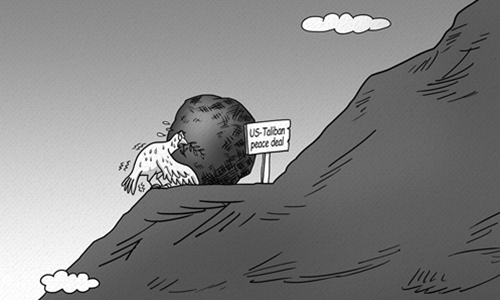HOME >> OPINION
US forces the burden of peace in Afghanistan upon Central and South Asian countries
By Xiao Bin Source:Global Times Published: 2020/3/5 0:18:40

Illustration: Liu Rui/GT
The US and the Taliban struck a deal on February 29, paving the way for eventual peace in Afghanistan, a war-torn country. US Secretary State Mike Pompeo called the agreement a "true test" of their commitment to peace.
Under the agreement, the US will reduce the number of US military forces in Afghanistan to 8,600 within 135 days. The Taliban promised not to let extremists use the country as a staging ground for attacking the US or its allies and vowed to hold peace talks with the Afghan government.
Both the US government and the Taliban claimed that the agreement has historical significance and is an important step for war-torn Afghanistan to achieve peace. Representatives from the Afghan government were also present at the signing ceremony, though they were not signatories.
The international community has generally welcomed the deal, but remains cautiously positive of the deal's prospects because of a trust deficit. On Russian social media platforms, some say the deal was signed because the Trump administration wants to throw the burden of Afghanistan to Central and South Asian countries.
Eighteen years into the Afghan war, the Taliban has taken grip of 50 percent of Afghanistan's districts and dragged the US into a deadlocked war. Some say the deal indicates that the Trump administration has surrendered, and its biggest benefit would be in restraining the Taliban from shooting at withdrawing US troops.
As the Afghan government was not a party of the deal, the deal has not gained wide support from Afghan society. The peace deal is only a promise of peace offered to the US while the Afghan people still face the risk of a civil war.
Two days after the signing of the peace deal, divisions emerged between the Taliban and the Afghan government over the freeing the 5,000 Taliban prisoners, and the Taliban ended a partial truce that preceded the signing of the deal.
The trust deficit means Afghanistan's neighboring countries will have to look for ways to secure their national interests. Although countries in Central Asia recognize the new Central Asia strategy of the US administration and its stance in solving the Afghan issue, some countries in the region including Kazakhstan, Kyrgyzstan and Tajikistan have chosen to strength multilateral security cooperation with Russia.
In November 2019, the Collective Security Treaty Organization (CSTO) Collective Security Council held a session in Bishkek, capital of Kyrgyzstan, and adopted a statement on interaction and cooperation to strengthen international and regional security. The statement says Afghanistan remains a territory of instability and a source of an immediate threat to the security of CSTO member states. The council also approved a set of measures to increase the effectiveness of joint action against extremists, terrorists and drug threats emanating from Afghanistan.
In addition, Afghanistan's neighboring countries have been expecting the Shanghai Cooperation Organization (SCO) to play an active role. At the Bishkek SCO summit in June 2019, SCO member states signed a "Roadmap for Further Action of the SCO Afghanistan Contact Group," which outlines cooperation with Afghanistan in terms of economic and trade, security and people-to-people exchanges.
To improve the framework of security cooperation and enhance the efficiency of drug crackdown cooperation among SCO member states, the Bishkek summit also decided to set up an anti-drug center and approved the Action Plan for 2019-20 on the implementation of the Programme of Action for the SCO Anti-Drug Strategy for 2018-23.
To offset the negative impact of a trust deficit, China has actively taken part in Afghanistan's peace process, including mediating relations between the Afghan government and the Taliban, setting up a dialogue mechanism among foreign ministers of China, Afghanistan and Pakistan, and establishing a joint counter-terrorism coordination mechanism involving Afghanistan, Pakistan and Tajikistan.
Moreover, China will also get involved in the construction of a China-Pakistan railway and a China-Afghanistan road, as well as 5G development in Afghanistan, to provide more opportunities for the peace process to succeed in Afghanistan.
The author is an associate research fellow at the Institute of Russian, Eastern European and Central Asian Studies, Chinese Academy of Social Sciences. opinion@globaltimes.com.cn
Posted in: VIEWPOINT